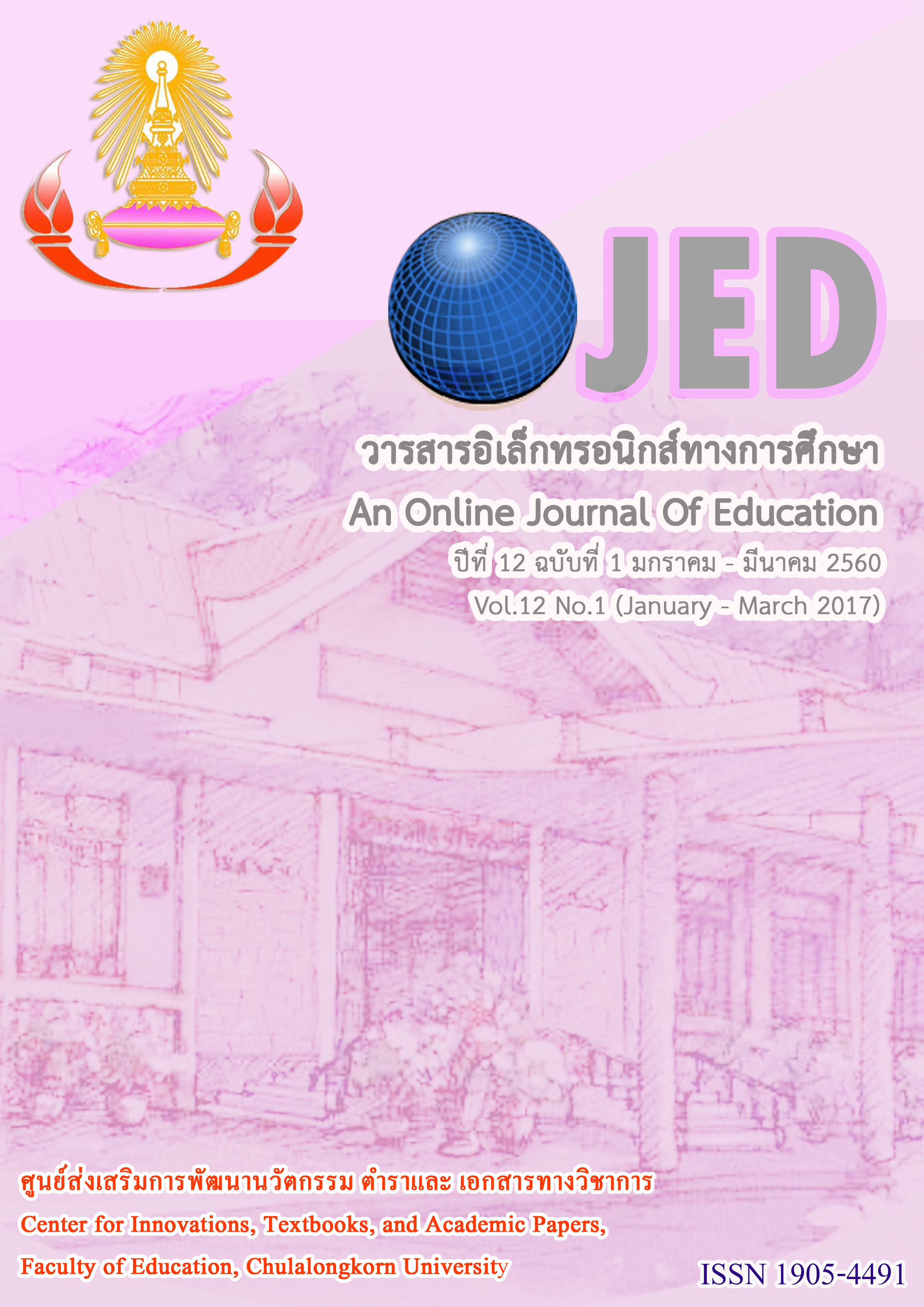ผลของกลยุทธ์การแก้ปัญหาเชิงตรรกะที่มีต่อความสามารถในการแก้ปัญหาและผลสัมฤทธิ์ทางการเรียนฟิสิกส์ของนักเรียนระดับมัธยมศึกษาตอนปลาย
Keywords:
กลยุทธ์การแก้ปัญหาเชิงตรรกะ, ความสามารถในการแก้ปัญหา, ผลสัมฤทธิ์ทางการเรียนฟิสิกส์, A LOGICAL PROBLEM SOLVING STRATEGY, PROBLEM SOLVING ABILITY, LEARNING ACHIEVEMENT IN PHYSICSAbstract
การวิจัยครั้งนี้เป็นการวิจัยกึ่งทดลอง มีวัตถุประสงค์ คือ (1) เพื่อศึกษาความสามารถในการแก้ปัญหาทางฟิสิกส์หลังเรียนของนักเรียนกลุ่มที่ได้รับการการจัดการเรียนการสอนโดยใช้กลยุทธ์การแก้ปัญหาเชิงตรรกะ (2) เพื่อเปรียบเทียบความสามารถในการแก้ปัญหาทางฟิสิกส์ของนักเรียนกลุ่มที่ได้รับการจัดการเรียนการสอนโดยใช้กลยุทธ์การแก้ปัญหาเชิงตรรกะกับนักเรียนที่ได้รับการเรียนการสอนแบบทั่วไป (3) เพื่อศึกษาผลสัมฤทธิ์ทางการเรียนฟิสิกส์หลังเรียนของนักเรียนกลุ่มที่ได้รับการการจัดการเรียนการสอนโดยใช้กลยุทธ์การแก้ปัญหาเชิงตรรกะและ (4) เพื่อเปรียบเทียบผลสัมฤทธิ์ทางการเรียนฟิสิกส์ของนักเรียนกลุ่มที่ได้รับการจัดการเรียนการสอนโดยใช้กลยุทธ์การแก้ปัญหาเชิงตรรกะกับนักเรียนที่ได้รับการเรียนการสอนแบบทั่วไป กลุ่มตัวอย่างที่ใช้ในการวิจัยครั้งนี้เป็นนักเรียนชั้นมัธยมศึกษาปีที่ 4 ปีการศึกษา 2559 โรงเรียนมัธยมศึกษา สังกัดสำนักงานคณะกรรมการการศึกษาขั้นพื้นฐาน เขตพื้นที่การศึกษามัธยมศึกษา เขต 6 จังหวัดฉะเชิงเทรา จำนวน 2 ห้องเรียน เครื่องมือที่ใช้ในการวิจัยได้แก่ (1) แบบวัดความสามารถในการแก้ปัญหาทางฟิสิกส์ที่มีค่าความเที่ยงเท่ากับ 0.86 และ (2) แบบสอบผลสัมฤทธิ์ทางการเรียนฟิสิกส์ที่มีค่าความเที่ยงเท่ากับ 0.80 วิเคราะห์ข้อมูลด้วยสถิติค่าเฉลี่ย () ค่าเฉลี่ยร้อยละ () ส่วนเบี่ยงเบนมาตรฐาน (S.D.) และทดสอบสมมติฐานด้วยสถิติทดสอบที (t-test)
ผลการวิจัยสรุปได้ดังนี้ (1) นักเรียนกลุ่มทดลองมีค่าเฉลี่ยคะแนนความสามารถในการแก้ปัญหา 159.07 คะแนนจากคะแนนเต็ม 200 คะแนนคิดเป็นร้อยละ 79.53 จัดอยู่ในความสามารถระดับดีและสูงกว่ากลุ่มควบคุมอย่างมีนัยสำคัญทางสถิติที่ระดับ .05 (2) นักเรียนกลุ่มทดลองมีค่าเฉลี่ยคะแนนผลสัมฤทธิ์ทางการเรียนฟิสิกส์ 24.14 คะแนนจากคะแนนเต็ม 30 คะแนนคิดเป็นร้อยละ 80.45 ซึ่งสูงกว่าเกณฑ์ที่กำหนดและสูงกว่ากลุ่มควบคุมอย่างมีนัยสำคัญทางสถิติที่ระดับ .05
This study was a quasi-experimental research. The purposes of this study were to (1) study the problem solving ability of students after learning physics through the teaching of a logical problem solving strategy, (2) compare the problem solving ability of students between an experimental group that learned the logical problem solving strategy and a control group that learned through a traditional method, (3) study the learning achievement of students after learning physics with a logical problem solving strategy, and (4) compare the learning achievement of students between an experimental group that learned physics with a logical problem solving strategy and a control group that learned physics with a traditional method. The sample were two classes of tenth grade students of an extra-large sized school under the Secondary Educational Service Area Office 6 of the Basic Education Commission of Thailand during the first semester of academic year 2016. The research instruments were the problem solving ability test with reliability at 0.86, and the learning achievement physics test with reliability at 0.80. The collected data was analyzed by arithmetic mean (), mean of percentage (), standard deviation (S.D.) and t-test.
The research findings were summarized as follows: (1) the experimental group had a mean score for the problem solving ability of 159.07 from a full score of 200, which at 79.53 percent was higher than that criterion set and was considered as good as, and even higher than, the control group at a .05 level of significance; (2) the experimental group had a mean score for the learning achievement in physics at 24.14 from a full score of 30, which at 80.45 percent was higher than the criterion score set of 70 percent and higher than the control group at a .05 level of significance.




